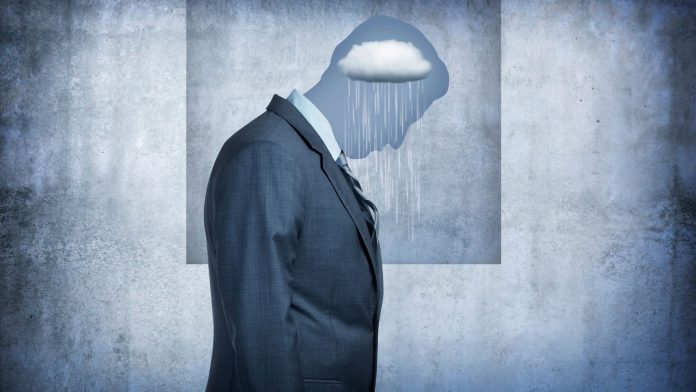“War and Peace: An Ex-Pastor’s Journey Toward Mental Health” is a sponsored post written by John Staub from Remodel Health. A former pastor and missionary, John specializes in change-leadership and helping organizations take full advantage of every new opportunity to make their greatest possible impact.
“That’s called anxiety,” the doctor said to me gently. “Did you ever know that you had anxiety, John?”
I did not.
That was the first time anyone had ever connected that word to me. Not only that, but I had never even thought of it. On the outside I looked carefree, active, and positive. That was true, I should say, until just a couple of weeks before this very season in my life — the season when everything changed.
I Had Burned Out And Was Trying To Put My Life Back Together.
I grew up in the church. The one particular denomination that I was raised in actually gave me a little pin when I was 7 years old for literally attending church every single Sunday for an entire year.
Yes, that is how much of a church kid I was. And not just a church kid, I was a pastor’s kid. My dad was the part-time worship pastor at a small country church about 30 minutes from our house. If there was ever someone who knew every part of the Sunday service, it was me.
From then on, I was involved in some kind of church activity every single weekend. In my late teens, my family moved to Brazil and we were missionaries for 3 years. When I returned stateside, I started working at our local church.
Eventually, I did what lots of young and still-maturing aspiring pastors do: I moved from church to church and state to state looking for my affirmation on success. It was all nestled within an authentic love for Jesus and the church, but at an unsustainable life-balance and unfocused passion for what matters most—what was really going on in my own “spirit, soul, and body” (1 Thessalonians 5:23).
Eventually, I “made it” and found my dream job in my dream role. Still, something wasn’t right. Without going into the full story, my journey did not end up the success I’d always dreamed of. Rather, mine is the story of burnout. And I wasn’t one of those pastors who took a break and came back refreshed… No, my journey as a pastor was over, and there would be no return.
Yes, I Did What So Many Pastors Fantasize About: I Resigned.
It was a shock to everyone around me. No one saw it coming and I left a trail of collateral damage along the way. Upon my departure, my former church sent me to an out-of-state trauma therapy center for an entire week. And yes, it was just as intense as it sounds. I was super skeptical, but really willing to do whatever it would take to get my life back on the right track. Since then, I have kept that mindset.
So, when I say I was willing to do whatever it would take to get my life back on track, I want to make sure each of you that is reading this knows that 1) I am still on a lifelong journey of becoming healthier and healthier, and 2) it has taken years and years to get me to where I am today (not only years of time, but months and months of intentional, engaged clinical therapy and healing community).
So Why Am I Even Sharing My Story?
This blog is not intended to diagnose anyone, or frankly even convince anyone that anxiety is real or not. My purpose in sharing my story is to simply begin a conversation. And hopefully as a result of that conversation, each of you reading this might be able to care better for the team around you, and most importantly, you will begin caring more for yourself.
Where Did It Come From And When Did It Start?
I remember overhearing my parents talk about my dad losing his job. I was 12 years old and our house was pretty small. But it wasn’t the words that I noticed—it was the tone of voice they both had. It was right then that I began to take upon myself a new level of fear. It wasn’t a what’s-in-my-closet-in-the-dark kind of fear, but a very tactical and functional fear of not knowing what might be in store for the basic parts of my life. Maybe this is where some of it started for me?
I also remember when I was 17 years old, looking down at my friend in Brazil. He was nearly my exact same age, and he had just passed away. I was in his small one-room home as his family mourned. They were extremely poor and lived in the slums. They hardly had money for food and clothing, let alone medicine.
Come to find out, the reason he hadn’t been to church the weekend before was because he had a very high fever. They went to the hospital to get treatment, but because they were poor—and the people there knew by the looks of the family they wouldn’t have the money to pay for the bills—they refused to treat my friend. He ended up dying right there in the hospital hallway.
Whether it was worrying about where my family would live or if I would get sick too and die at a young age, I’m not sure where my anxiety started to pile up and rewire my brain. If you think about it, I suppose it’s the same way with a lot of things. We’re not always sure how it started, or where it came from, but we’re definitely sure that it’s there and we’re even more sure that we need to get a handle on it or it will keep getting worse.
What Is Anxiety?
Northwestern Medicine gives a great explanation of anxiety, explaining the limbic system consists of those mysterious-sounding parts of the brain like the hippocampus, amygdala, hypothalamus and thalamus. The limbic system is responsible for most of our emotional processing. Scientific research from the last several decades helps us to realize that people with anxiety actually have a more active limbic system.
But perhaps a better way to understand it is how my doctor explained it to me: “John, your brain is superhuman! You have the power to think through lots of different things really fast—faster than most people. But because of that, you can also come up with a million different ways things could go wrong and then your brain tells your body to be afraid. And even though you aren’t really afraid, for some reason, it still feels like it.”
Maybe this helps you understand a little bit more about the medical part of anxiety. Hopefully it helps you gain some extra compassion for the entire topic and provides language you can use as you talk about it.
After all, the topic of mental health isn’t going away. In fact, we’re all becoming more and more aware of the way anxiety finds itself in so many parts of our lives every single day.we’re all becoming more and more aware of the way anxiety finds itself in so many parts of our lives every single day. – John StaubCLICK TO TWEET
Unexpected Side-Effects Of Poor Mental Health
I am not a doctor. So please don’t use this like WebMD. If you’re actually interested in having a medical conversation, please see someone who is trained in medicine! But as a tool to keep the conversation going and to get the pot stirring, here are some of the things that I had no idea were connected to my own anxiety, and that may potentially be connected to you or someone you know, as well.
Often Distracted — Because my brain is firing away way too fast, I can move from one thing to another very quickly. It’s not because I don’t like the original topic, but it’s sometimes that I didn’t even realize the topic had changed. There are even times I am talking with someone and I can think of 5 different things while they are talking and then I just circle back around by the time they’re done talking.
Quickly Irritable — I’ve found my most irrational responses come when my anxiety is high. When I snap at something that just doesn’t make any sense, I’ve found that I need to identify that emotion and then begin to walk through my steps to intentionally refocus myself appropriately. It doesn’t work every time, but it’s a healthy thing to practice.
Heightened Emotions — Similar to irritability, this affects all emotions. Sometimes even my ability to enjoy time with my kiddos because I am so worried that I’ll miss the moment or that this moment is the very last moment of this type of thing I’ll ever do. I’m serious! In the blink of an eye, I realize that “this is the last time they will ever…” and then I’m all distracted by my sentiments instead of soaking up the moment. Sure, it’s cute when a dad loves their kid that much. But I’ve found my anxiety does not enhance those moments.
Hyper-Organized — Whether you have also been called a “control freak” or even the clinical OCD, the concept of keeping everything in its place is a big sign of anxiety for me. I had once been worried that I was controlling and talked about it to my therapist. And then to another therapist. I was worried that my tendencies to manage every contingency was coming from a more sinister place. Both therapists said that I was hyper-organized because I have the ability to think through all of the things that could go wrong and I’m trying to protect myself and others. This was a wonderful encouragement to me, and I hope it might be to you, too!
Always on the Move — Similar to being distracted is just moving nonstop. I mean literally moving your body. There are some days when I realize that I hardly sat down at all. Especially on a Saturday, when I am supposed to be resting. I will be doing stuff, walking, getting up, going here, etc. nonstop from sunrise to sunset. The best diagnosis that I’ve gotten is that doing something helps to keep my brain focused on one thing and helps me cope with the many things that are shelved when I stay active. And sure, stamina can be a superpower. But that pace is simply unsustainable, and I’ve learned that the hard way, many times.
You may need treatment or medicine and that’s okay!
You’re okay with taking medicine for a headache, right? Sure you are! And even if you’re not okay with that, you’re okay with having a doctor fix your broken leg, or even do surgery on you if you had a bad accident, right? Absolutely! The same mindset should be true around treatment for your mental health.
Mental health is brain health and brain health is body health. We have been comfortable with body health for centuries because it’s been discovered for longer. But thankfully, we’re starting to understand the way the brain works and we now have medicines and treatments that work better than ever, and are truly helping to be a God-given way to bring healing and a wholeness to people.Mental health is brain health and brain health is body health. – John StaubCLICK TO TWEET
Covid-19 Made It Worse On Everyone.
I can tell you what: Being someone with anxiety does not feel like a superpower. Not at all! It’s weird to regularly carry around the sensation of feeling afraid, even when you’re not. But the problem isn’t always just those standard fast-firing synapses—the bigger issue is when there actually is a reason to be afraid. Especially when it is a global pandemic that has kept on going for 2+ years now.
Nearly half of all Americans struggle with their mental health according to the latest data. That means when you’re walking down the street, or you’re walking into church, or you’re walking into your staff meeting, 1 out of 2 people in that room are struggling with anxiety, depression, and more.
Barna Research shared at the end of 2021 that 38% of pastors have thought about quitting. And 1 out of 4 pastors self-identify as being unhealthy right now. The pandemic’s toll on our mental health has been catastrophic, and we are just beginning to see the long-lasting impacts it will have on us and on future generations, as well.
There is an urgent need to care better for one another and get each of us the help that we need to find health in a world that has been so sick for so long.
So What Can You Do About It?
1. Take Care Of You
There is a close connection between the way you take care of your physical health and the impact it has on your mental health. In my own story, during the pandemic, I quickly saw myself gain 40 pounds—the result of inactivity and overeating. The toll was more than just physical though, as I saw a decline in my mental health, similarly to the rest of Americans.
Truth is, there are some things we can’t change in life. But there are so many things that we can change and that will improve how we live and perhaps even more importantly how we feel! For some of you, this means to slow down and stop for moments of selah. For others, taking care of you means physically moving and getting your body active.
Additionally, our bodies are fueled by what we put inside of it. That goes for anything we consume, whether that be food, news, scripture, social media, entertainment, etc. And it’s really important to ensure that what we are consuming on a regular basis is the fuel that we need for our bodies and our minds to work at optimal levels.
2. Tailor Your Schedule
Our time is one of the most precious things that we have. And for many of you reading, you may feel like you don’t have any flexibility to what you do with your time. I can certainly empathize with those seasons of life. Sometimes they can seem endless—the grind is real!
In Carey’s new book, At Your Best, he mentions right from the start that it’s important to build lives that we don’t want to escape from. Learning about ourselves and evaluating new ways of accomplishing our tasks is crucial to better self-care. Making intentional choices around setting ourselves up well is crucial for thriving in our mental health.Making intentional choices around setting ourselves up well is crucial for thriving in our mental health. – John StaubCLICK TO TWEET
For me, that meant talking with my boss about adjusting my work schedule to avoid rush hour traffic, something that often stressed me out and left me frazzled for hours. I believed it would help me be more productive, and asked if we could test it out. Thankfully, it worked! And way better than I ever thought. Who knew that simply changing my drive time would have helped with my mental clarity throughout the workday?
I agree with Carey and believe that each one of us has something in our life—whether personal or professional—that we have the power to change in our schedules to be better tailored to our mental health. I’d encourage you to evaluate this with someone close to you so that you can truly be at your best!
3. Technology To Talk
Therapy has never been more logistically accessible, thanks to technology. And before you go and say you’d never be able to connect with a doctor successfully over the phone, let me just remind you that the entire world kept going (in most ways) by leaning into new ways of communicating with one another.
Zoom, FaceTime, email, Slack, Instagram DMs, and so many more have all opened up the planet to sharing and listening to each other in ways that we never did before. But it’s not just social media and work meetings that have developed. Technology has the ability to help us be healthier now, too.
Along with all of the above mentioned apps, there are some incredibly powerful tools for telehealth services. Whether it’s college students connecting directly with a therapist using an app on their cell phone so they have it when they need it, or finally being able to stay on a regular therapy schedule to take one step at a time on your mental health journey, without having to drive all the way to an office.
4. Tap Into More Money
“Even if I wanted to do something about it, mental health is expensive!”
Sadly, I hear this all the time. And even more sad is that it’s true. In the United States, mental health benefits are often financially inaccessible to most people, even for those with health insurance. The reality is that to make an impact on mental health, it’s going to cost you more money. Especially if you are an employer providing benefits to your team.
But what if there was more money waiting to be tapped into and you could use it to start making your benefits better? The good news is that there is and I am passionate about helping leaders like you know about it! The truth is that those old group health plans we’re so used to are just like those old pension plans from the 1980s—they’re outdated, not personalized, and way too expensive. Which is why the latest style of health benefits for teams is way better.
Over the last decade, a new delivery method has developed called managed individual health benefits. And without going into all of the details of how it works, it’s the equivalent of 401(k) but used for health needs instead of retirement. It’s personalized to each employee, which is great. But most importantly, it lowers the cost by 51% on average and allows employers to finally give more benefits without spending more money.
Go to remodelhealth.com/carey to learn more—it’s simple and helpful. But most importantly, no matter what you do, just don’t do nothing! Start a conversation, begin learning, and take one next step to care better for yourself and for those that God has put around you.
About Remodel Health
Remodel Health is the health benefits software for employers that helps you save money and care better for your team. Remodel Health helps employers offer more health benefits options than ever before using a managed individual approach to health insurance. With a full spectrum of options — from our time-tested and exclusive WageUp solution to sharing programs to individual coverage HRAs — finding a perfect fit for your team is closer than you think.
Our health benefits consultants walk beside each organization to tailor health benefits to your organization’s needs and help you determine which product will serve your people best. The best part? Remodel Health customers save an average of 30-50% on their health benefits!







